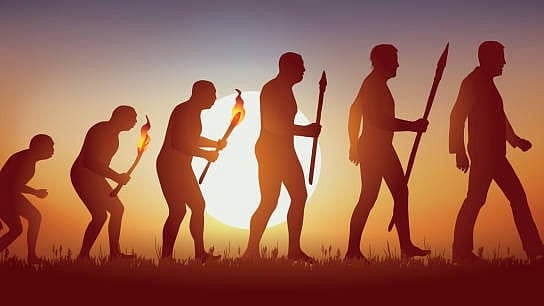
Image for representative purpose.
Credit: iStock Photos
One of the agendas of any political decision, in the words of Lasswell (1936), is aimed at “Who gets What, When, and How”. This is reflected in the political behaviour of closely related mammals, namely, chimpanzees and humans, with almost similar strategies. Of course, these strategies are modified and elaborated due to language and culture in humans, as expected from Darwin’s dictum, ‘Descent with modifications.’ These mammals belong to a group called primates. In the evolutionary scenario, chimpanzees appeared earlier than Homo sapiens. Extensive investigations into the social organisation of chimpanzees have shown that the strategies to gain and/or retain power are also reflected in human political manoeuvres. Many political schemes are not unique to human politicians. Human political behaviour has roots in our evolutionary relatives, particularly chimpanzees and non-human primates in general. This is aptly expressed as “chimpanzees are almost too human to be true,” reflecting what is called phylogenetic continuity or inheritance.
Professor Frans de Waal is a pioneer in understanding chimpanzee politics. His work has illustrated the evolutionary basis of human political behaviour. He studied this behaviour under experimental conditions (Burgers Zoo in Arnhem) as well as in natural populations. A few aspects of political behaviour that play a significant role in accessing resources, power, or even mates, which are also seen in humans, are discussed below.
Cooperation and conflict within a group or between groups have a notable impact on evolutionary fitness. Cooperation, an important political behaviour, is crucial to achieving the intended result, such as acquiring more resources. Chimpanzees live in social groups of about 45 to 50 individuals and have well-structured hierarchical societies. The members of the society recognise one of the males as their leader, called ‘Alfa male,’ who has powers to make decisions. Males engage in a variety of ‘social manoeuvring’ acts to reach the top. Frans de Waal, the author of Chimpanzee Politics, says that the alpha leader dominates all others through tactics of threat, intimidation, and aggression, and, most importantly, by forming short-term coalitions with other high-status males. Once the crisis is over, the rival males pay homage to the alpha, visiting him, grooming him, and expressing various forms of submission. This is akin to human political behaviour.
Frans de Waal said, “You don’t need to be the biggest and strongest male,” and even “the smallest male, if he has the right allies and friends and keeps them happy, he can be the alpha male.” Psychological research shows that among chimpanzees and humans, socially dominant leaders are especially inclined to form short-term contractual relationships grounded in pragmatics rather than principles. Such temporary deals may work today but may be gone tomorrow, and they may also turn allies into enemies. Even the biggest and most aggressive alpha chimp needs allies and support from the masses. Diplomatically, the leader has to keep these supporters happy. Diplomacy involves forming coalitions with other males. To gain this, the chimpanzee leader would tax the group and then return those resources to supporters. Such an opportunistic strategy is common among human politicians within parties. Another similarity involves conflict between groups. Chimpanzees often raid and ambush other troops, brutally killing rival group members. This is equivalent to the dominant political parties silencing the minority ones with appropriate manoeuvres. Sometimes chimp societies face danger from other animals. Under such situations, Alison Cronin, an international expert in the rescue and rehabilitation of abused primates, has opined that “If you have an external threat that’s a danger effectively to everybody, it brings
the group together; you rally together.” Similarly, in human political scenarios, rival groups join forces to face an external threat to their survival.
Jane Goodall, who was living with chimpanzees in the Tanzanian rainforest, stated in her book The Chimpanzees of Gombe that the chimpanzee community is a “fusion-fission society.” Chimpanzees form hierarchical groups (a fusion of chimps), but within each community exist smaller social groups whose members often change (a fission of chimps). It appears that fission-fusion illustrates a lack of commitment. It can be useful when one chimp cannot tolerate another. Their society, like ours, involves friends, rivals, and power struggles, and sometimes two chimps simply can’t get along. Rather than remove either from the troop, both can join separate groups and have companions, flowing freely between them. This way, relationships, alliances, and freedom of association continue. Similar opportunistic fusion-fission are seen at all levels of political organisations, particularly when coalition governments are formed in countries across the globe. In view of such opportunistic decisions, it will be difficult to predict ‘Who gets What, When, and How’.
(The writer is a former VC of Bangalore University)